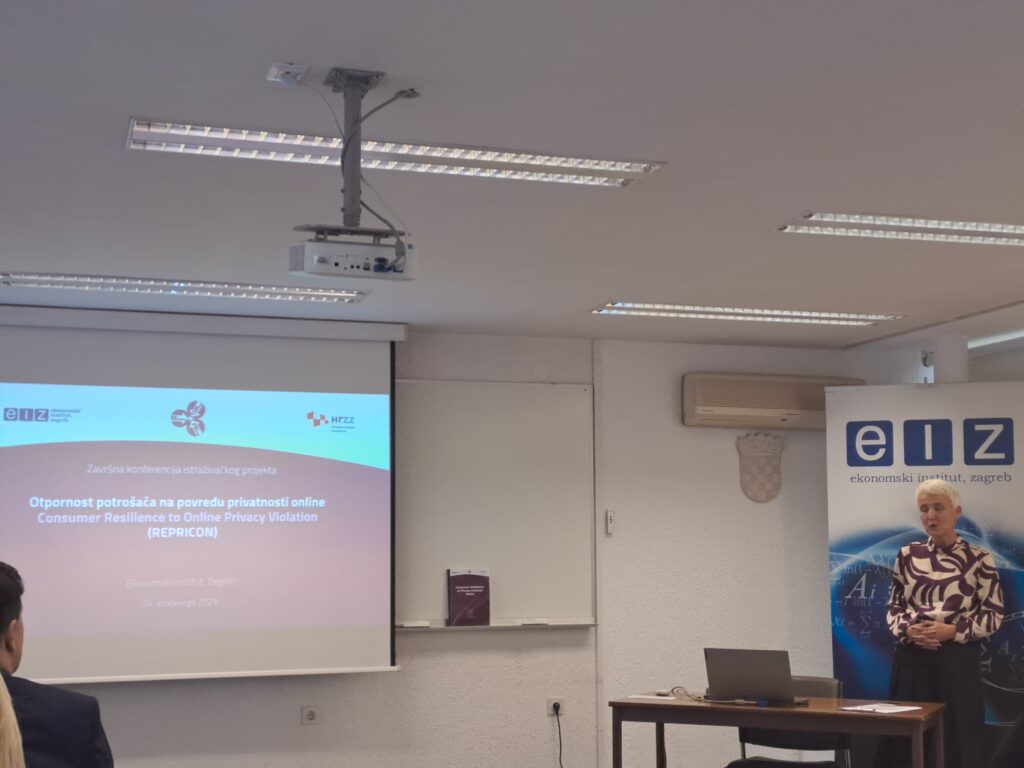Final conference of the research project REPRICON

On 24 November 2023, the Institute of Economics, Zagreb hosted the closing conference of the research project IP-2019-04-7886 “Consumer Resilience to Online Privacy Violation – REPRICON“. The Principal Investigator of the project, whose project implementation period finishes on 2 January 2024, was Dr Jelena Budak, PhD.
The ultimate objective of the REPRICON research was to empirically test the model of individual resilience to online privacy violation; in other words, to explore how individual online behavior changes after the occurrence of violation of privacy on the internet.
The authors’ model defines several outcomes of an online privacy violation incident (OPVI): i) no change in the behavior, indicating resistance to privacy breaches; ii) full recovery, meaning that individuals bounce back to their normal activity as it was before the stressful event happened; iii) partial recovery at the worse-than-before level; iv) recovery at bounce-back-better level in which a negative event passed without severe consequences, so the consumer stopped worrying about privacy violation and intensified online activities (thriving); and v) a complete termination of previous activities online that were affected by a privacy violation event.
The authors attempted to explain the probability of each of these outcomes by a combination of several contributing factors: psychological factors (such as extraversion, openness, agreeableness, conscientiousness, neuroticism etc.), individual attitudes toward Internet usage (privacy awareness, perceived benefit of Internet usage, need for privacy etc.), individual socio-demographic characteristics and digital literacy, micro-environmental factors (social support, etc.), and macro-environmental factors (laws, customs, and cultural practices, etc.) – a total of 26 variables. The main research method used was a structured questionnaire administered by means of a telephone survey. The team collected responses from more than 1,000 internet users who experienced an OPVI.
The research has shown that internet users in Croatia have developed a certain level of resilience to online privacy breaches (> 3 on a scale of 1 to 5). For most respondents, it did not take too much time and trouble to recover from the most recent OPVI they experienced.
When it comes to OPVIs, annoying advertisements, unwanted commercials, and recording the user’s location and activities when online are the most reported OPVIs, hence without financial losses. The results show that variation in individual resilience to online privacy violation is explained primarily by personality traits. Regardless of gender, age, income or education attained, a more open and extroverted person would more easily cope with the stress an online privacy incident would cause. In contrast, neuroticism as a personality trait would make Internet users less resilient to OPVI. Psychological factors do explain behavior in online settings and should be included in online user behavior studies. In addition, those who see positive outcomes of using the Internet would recover faster or cope easier with the OPVI. The highest concern about online privacy is reported about extensive collection of personal information over the Internet. Online privacy concern weakens individual resilience to OPVI, as does digital anxiety: Internet users who feel worried about the digitalization process and express aversion toward computers and advanced ICT, demonstrate less resilience to OPVI. Similarly, Internet users with better digital skills and advanced Internet literacy are more resilient to OPVI. Further, a wide range of activities an Internet user performs online, including more complex ones, is associated with more resilience, regardless of the time a person spends on the Internet.
The main finding of the REPRICON project is that, after being victims of online privacy violation, more resilient Internet users would continue to perform their activities online at the same or even higher level than before the incident. The “bounce back” will be faster and more intense if the online privacy breach is perceived less serious. Thus, the authors have confirmed that behavioral outcomes after online privacy violation depend on individual resilience.
The project has thus far resulted in nine publications in academic journals and conference proceedings. More information about every stage of the research – theoretical framework, various definitions of resilience, research method, explanation of all the variables tested, results and analysis as well as the original questionnaire can be found in the project booklet available here.

